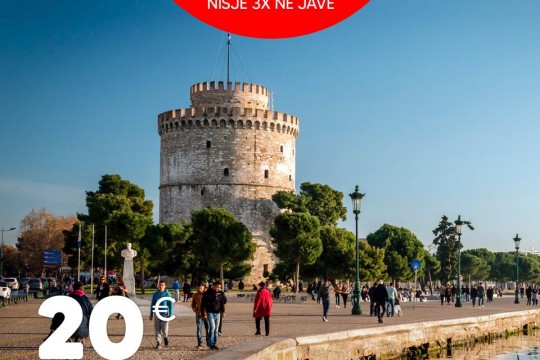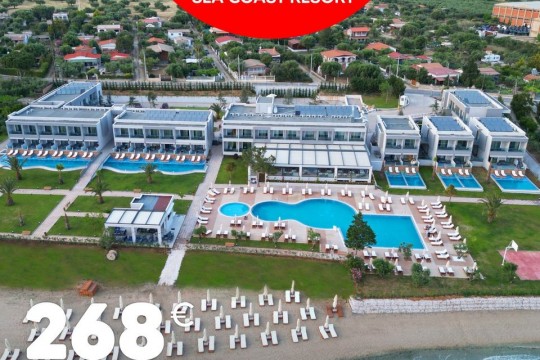- Vizitë ditore në Selanik
- Linja KOSOVË - ZVICËR - KOSOVË
- Linja PRISHTINË- TIRANË - PRISHTINË
- Vlorë, Berat dhe Tiranë
- Ofertë në NAPOLI-AMALFI-POSTIANO-SORRENTO
- Ofertë në ZAKYNTHOS
- Rezervime me aeroplan
- Pako individuale
- Arazhmane turistike
- Udhëtime grupore
- Autobusa me qira
- Ku ndodhemi
- Kushtet e udhëtimit
Planifikoni pushimin tuaj me kohë dhe përfitoni oferta me çmmime speciale për eraly booking
Oferta të ndryshme për vizita ditore në vendet më atraktive në vend dhe rajon me çmimet më të mira
- Ofertat 1natë/2 ditë
- Oferta 2netë/ 3ditë
Shërbime cilësore dhe staf i dedikuar për të pfruar cilësi dhe ekselencë të shërbimeve
Sharr Travel si agjenci operon në vend tash e 15 vjet, duke u ofruar klientëve udhëtime dhe pushime të klasit të parë,

Hyrje në sistem
Çasje e kufizuar për agjentët e shitjes. Nëse i keni harruar të dhënat e hyrjes kontaktoni me ne

Sharr Travel si agjenci operon në vend tash e 10 vjet, duke u ofruar klientëve udhëtime me autobus, aeroplan dhe traget. Sharr Travel me përfaqësi në Prishtinë e Prizren, është e përkushtuar në ofrimin e shërbimeve të transportit rrugor me autobusë modern e komod, shërbime të transportit ajror me aeroplan të kompanive më të njohura botërore. Sharr Travel njihet për stafin e saj profesional dhe për eksperiencë të gjatë në fushën e turizmit.
Gjithashtu ne si agjenci ofrojmë udhëtime për grupe të organizuara brenda dhe jashtë vendit, duke siguruar transportin, akomodimin dhe vizitat e vendeve kulturore historike.
- Rezervimin e biletave për të gjitha destinacionet boterore.
- Pjesëmarrjen në panairet, kongreset, konferencat ndërkombëtare.
- Rezervimin e hoteleve anembanë botës.
- Rezervime për udhëtime me autobus komod për Zvicer, Itali, Gjermani, Austri, etj.
- Aranzhmane turistike verore dhe dimërore.
- Lundrime me Traget.
- Udhetime grupore.
- Ekskurzione brenda dhe jashte vendit.
- Vizita vendeve kulturore historike.
- Ofrojme autobusë, minibusë për shërbime ditore, javore dhe mujore.
- Shërbime tjera sipas kërkesave.
Sharr Travel -SELANIK
- Shpërndaje:
https://sharrtravel.com/
https://www.facebook.com/SharrTravel
https://www.instagram.com/sharr_travel/
Sharr Travel
Shitës privat.

Gjej shpallje të ngjashme

Sharr Travel -Fundjavënë Korfuz, Sarandë & Vlorë

Sharr Travel -Fundjavë në Dubrovnik

Sharr Travel -Vizitë njëditore ne Selanik - Greqi


Fibula Travel -BULGARIA 2024

Sharr Travel -ZVICËR - KOSOVË - ZVICËR

Sharr Travel - 𝗦𝗲𝗮 𝗖𝗼𝗮𝘀𝘁 𝗥𝗲𝘀𝗼𝗿𝘁 𝟱* 𝗛𝗔𝗟𝗞𝗜𝗗𝗜𝗞𝗜

Sharr Travel - Grand Blue Fafa & Spa 5* (Durrës)

Sharr Travel -VM Resort & Spa, Durrës

Sharr Travel -Epidamn Resort & Spa 5* (Durrës)
Identifikohu

- Share full article

‘Yo Soy la Mamá’: A Migrant Mother’s Struggle to Get Back Her Son
She came to the United States fleeing her abuser. When child welfare got involved, she risked losing her son forever.
Ricardo was separated from his mother, Olga, at the age of 5. They are from Honduras. Credit... Eva Marie Uzcategui for The New York Times
Supported by
By Deborah Sontag
- March 25, 2024
Over the final four months of 2021, Olga, a Honduran immigrant in Hollywood, Fla., grew increasingly panicked. She could not find her 5-year-old son, Ricardo. After she’d fled her homeland to escape her abusive husband, the man also migrated, disappeared with the boy and broke off contact.
By day, Olga lived her life. She cut, colored and styled hair at a Miami salon, chatting with clients as if she hadn’t a care in the world. She mothered her 7-year-old daughter, Dariela, straining to distract her from the fact that her little brother was missing. But the nights were tough. “I cried into my pillow,” Olga said. “Where was my sweet little boy? Was he, at least, safe?”
He was not.
By the time Olga, then 28, tracked her son to Massachusetts, he had been removed from his father over allegations of physical abuse. Calling office after office of the Department of Children and Families, she finally reached a woman who turned out to be Ricardo’s caseworker.
“Who are you?” the woman said.
“ Yo soy la mamá,” Olga replied, bursting into tears.
In early January 2022, Olga, who asked that her last name be withheld to protect her children, flew to Boston. It would only be a matter of presenting evidence — Ricardo’s birth certificate, videos of him on her phone, DNA if necessary — before she could take him home, she thought.
But when immigration and child welfare are involved — two contentious issues and their beleaguered systems — nothing is straightforward.
Under an interstate compact, Massachusetts formally asked Florida to approve the relocation. Florida said no. Though a caseworker found Olga to have a clean record, a proper home and sufficient income, she denied the move because Olga was not a legal U.S. resident.
Massachusetts does not consider undocumented status a reason to prevent reunification with a parent. But intensely cautious amid a scandal involving another child’s death, the state’s child protection authorities froze, sending Ricardo on a destabilizing odyssey through the foster care system. In a case that reveals the unique vulnerabilities of unauthorized immigrant parents, Olga risked losing her son forever.
Immigrant family separation did not start or stop with the Trump administration’s thwarted “zero tolerance” policy. Now as before, and with record numbers of new unauthorized immigrants fanning out across the country, it happens more insidiously.
“When people think of family separation, they think of the Southern border and kids in cages,” said Lori Nessel, director of an immigrant rights clinic at Seton Hall Law School in New Jersey. “But people don’t realize how much this occurs every day in the interior of the country.”
Like other poor parents, unauthorized immigrants encounter the chronic fallibility of state-run agencies in which Black and Hispanic children are overrepresented. They also tangle with the antiquated bureaucracy that governs the relocation of children across state lines.
But their status puts them at an additional disadvantage. They confront language and cultural barriers as well as limited access to services and benefits, fear of immigration enforcement, inadequate legal representation and, finally, anti-immigrant bias.
Additionally, many caseworkers and judges harbor the misconception that all unauthorized immigrants are on the brink of deportation, viewing their homes as inherently unstable. Yet fewer than 1 percent were removed by Immigration and Customs Enforcement last year.
Cristina Cooper, senior attorney with the American Bar Association’s Center on Children and the Law, described Florida’s decision in Olga’s case as “shocking and harmful.” Undocumented status alone does not make a parent unfit. And under the 14th Amendment, fit parents, regardless of immigration status, have a protected right to the care, custody and control of their children.
Asked whether it was now Florida’s policy to refuse custody based on immigration status, Miguel Nevarez, press secretary for the state’s Department of Children and Families, neither answered directly nor denied it. “Cases regarding one’s legal or illegal status wouldn’t exist if the federal government enforced our immigration laws,” he said.
In Olga’s case, that line of thinking trickled down to South Florida from Tallahassee, where Gov. Ron DeSantis signed a bill last spring that he proudly called “the strongest anti-illegal-immigration legislation in the country.”
When Olga’s advocates phoned her caseworker’s supervisor, according to Nick Herbold, the boy’s first foster father, the woman told them: “Hey, we’re in Florida. She’s undocumented. There’s no concern about the home. There’s no concern about safety with the mother. It’s just the fact that politically we cannot sign off on it.”
Olga never intended to be an undocumented immigrant. If she ever journeyed north, she thought, she would do so with a visa.
What changed her mind was something that propels many women to leave Honduras, according to a report by the Washington Office on Latin America : “domestic violence and a lack of resources for protections or aid.”
Growing up near the Maya ruins of Copán, daughter of a tailor and a factory worker, Olga set her sights on a professional career. But in her first year studying law at the University of San Pedro Sula, she met Ricardo’s father. (He did not respond to messages from The New York Times.) In her second year, she got pregnant and dropped out.
Even before they married, her boyfriend became volatilely “ machista ,” she said. After their two children were born in quick succession, he turned physically abusive to her and Dariela. When she finally kicked him out, she didn’t trust him to stay away.
Selling property, Olga raised $10,000, enough to pay the way to the United States for herself and one child. Leave Ricardo with me, her mother said, pledging to travel north with him later.
The journey was harrowing, but once Olga and Dariela were safely ensconced in a relative’s spacious house in Coral Gables, Fla., Olga started to regret leaving the boy behind.
Still, Ricardo was fine with his grandmother — until his father showed up and forcibly reclaimed him, Olga said. The man then traveled with Ricardo to the coffee fields of Hawaii and eventually disappeared with him into the vast U.S. mainland.
In mid-November 2021, Ricardo’s father enrolled him in kindergarten at the Albert F. Argenziano School in Somerville, Mass. Four days later, Ricardo told his teacher that his body hurt. A child who idolizes superheroes, he willed himself not to cry as he revealed a vivid bruise on his leg and confided that his father beat him with a belt when he misbehaved.
Alarmed but not wanting to alarm the rest of the class, the teacher, Ilana Cohen, quietly asked her paraprofessional to take the small child with the soft brown eyes to the health office. Down the hall they went, sneakers squeaking on linoleum past a rainbow-decorated bulletin board that proclaimed: “YOU BELONG HERE! YOU MATTER!”
The nurse observed not only the contusion on Ricardo’s leg but also other, fading bruises. She alerted the principal, Glenda Soto, that she would have to immediately report suspected abuse to the child welfare department.
“O Lord, give me strength,” Ms. Soto said to herself. In her seven years as an administrator at Argenziano, an elementary school with nearly 600 students, she had dealt with only one case in which a child had to be taken from a parent.
Ricardo was whisked away for a forensic examination at Boston Children’s Hospital. Christianne Sharr had just started there as a physician assistant, though she was not at work when her phone rang late that Thursday.
“We have an emergency removal,” a foster care worker said. “The child needs a home tonight.”
Ms. Sharr and her husband, Mr. Herbold, a software engineer, were new foster parents, having been eager during the pandemic “to do something hopeful when the world felt superheavy,” she said.

At 3 a.m., a social worker delivered Ricardo to the porch of their Cambridge home. When he shifted the sleeping child into Ms. Sharr’s arms, she studied his face and thought, “Oh, he’s beautiful.” After tucking him into bed, she kept vigil outside the bedroom until day broke and she heard him stir.
Leaping up, Ricardo ran to the window. “Papá! Papá!” he cried. He had been on the move for much of the year. Now, like his mother, he had no idea where he was.
On that first day, Mr. Herbold and Ms. Sharr whisked Ricardo away to a preplanned family gathering at a farm resort. In their hotel room, when he and Ms. Sharr were building block towers, he blurted, “Oh, you know what I want to tell you? I want to tell you that sometimes my dad scares me.”
Ms. Sharr, fluent in Spanish, answered: “OK, tell me more.”
“You know, he hit me here,” Ricardo said, pointing to his leg. He tapped the nape of his neck. “There was one time he hit me here.”
“Oh, my,” Ms. Sharr said. “I’m so sorry that happened to you.”
The following week, the Department of Children and Families, known as D.C.F., granted Ricardo’s father a supervised visit at the school. When Ricardo saw his father, he collapsed, screaming and crying.
Afterward, the principal, Ms. Soto, who is Puerto Rican and bilingual, intercepted the man. “I need to ask you, Where is Ricardo’s mom?” she said. “Because she needs to be notified.”
The man insisted he had no idea, but the principal did not buy it: “I told D.C.F., ‘This is very fishy — it feels to me that he’s hiding something.’ And D.C.F. assured us that they had their technology specialists trying to find her.”
What precise steps they took are unclear; child welfare cases are confidential. But generally speaking, the agency said, “when a child enters foster care, D.C.F. first tries to safely reunify the child with their biological parents by working collaboratively with immediate and extended family.”
At significant cost to Olga and Ricardo, that initial effort failed.
From that point onward, the school took Ricardo under wing. “I felt, you know, in the absence of his mother, we have to try to replace that here in the building,” Ms. Soto said.
In his English-immersion kindergarten, his teacher understood that he needed “an extra piece of care.” While a quick learner, he would sometimes crumple. If he got frustrated writing his letters, he’d scribble over his work with an angry pencil. When he grew restless during individual work times, Ms. Cohn took him on walks, having planted ninja toys in the hallway that Ricardo could search for along the way.
“We spent a lot of time together, a lot of time just holding hands,” she said, adding that she considered Ricardo “kind of magical,” with a gift for making people “love him and go out of their way to take care of him.”
At home, his foster parents focused on developing a routine.
Every morning, they woke him with a peppy playlist of Latin music and made light of wadding up his sheets when he wet his bed. He dressed himself, with flair, gravitating to dark jeans, dress shoes and a dab of cologne. Following his after-school program, Ricardo walked their dog and did some schoolwork. On weekends, there was family swim at the YMCA, followed by games on the Nintendo Switch with Mr. Herbold.
A month later, shortly before Christmas 2021, the child welfare department announced it was going to move him.
Ricardo’s principal and foster parents worried about inflicting another disruption. But under federal law, states must consider “kinship care” for foster children, and Ricardo’s father proposed his girlfriend’s sister.
In legalese, she was “fictive kin.” Yet fictive kin are supposed to have a relationship with a child, whereas Ricardo didn’t know the woman.
“It really wasn’t right,” Ms. Soto said. “He was so OK with Christy and Nick.”
In mid-January, Olga nervously paced the lobby of a Boston Holiday Inn, waiting for a social worker to arrive with her son. When they walked through the door, she fell to her knees and enveloped him in her arms.
Ricardo wriggled out of her embrace, shouting: “What took you so long? Why didn’t you come find me sooner?”
Olga was at a loss to explain to her 5-year-old just how desperately hard she had tried, how nobody had notified her and how she had tracked him down through a network of relatives only after months of detective work. She showered him with presents and, when he softened, kisses. At their visit’s end, she took his picture in the woolen hat with tasseled ear flaps she had brought him, capturing the sad eyes of a boy about to be separated from his mother again.
Civil rights groups have long accused the D.C.F. of mishandling immigrant families.
Hispanic children, who, like Black children, are more likely to be reported for neglect or abuse, are also more likely to be removed from their homes and more likely to be placed with strangers. They get moved around more and tend to stay longer in foster care.
But language barriers compound things. In a federal civil rights complaint, the Greater Boston Latino Network and other groups have accused the department of failing to provide adequate interpretation services, creating a risk of wrongful family separations.
Olga was appointed a free lawyer who did not speak Spanish. Because her English was still rudimentary, she decided to pay for one who did, and that cost her more than his $2,000 fee: The lawyer specialized in immigration, not family law. And it appears from the docket — the record is impounded — that he failed to make what could have been a crucial early plea.
In his place, lawyers consulted for this article said they would have immediately requested a temporary custody hearing and argued that Olga should be presumed fit absent any proof that she posed an imminent risk to her child. A simple background check could have been done and the judge could have questioned Olga. And then, in the best of circumstances, Olga could have walked out of the courtroom with her child.
But the child protection system was at that very moment embroiled in a cross-border custody scandal.
It involved a 5-year-old girl named Harmony Montgomery, a ward of the state whose father, a New Hampshire resident, had sought her custody. Abiding by its internal regulations, the Massachusetts D.C.F. asked New Hampshire to approve the move under a 62-year-old agreement called the Interstate Compact on the Placement of Children. But the judge disagreed with this request, considering it an infringement on the father’s right to parent his child, and did not wait for New Hampshire to respond.
The interstate compact was created primarily to govern cross-border foster care moves. Whether it applies to fit parents has been widely debated across the country, and high courts in at least a dozen states have said it does not.
The National Association of Counsel for Children agrees. “Applying the compact to parents who simply live out of state, when there is no finding or even allegation of wrongdoing, is unconstitutional and harmful to children,’’” said Allison Green, its legal director.
But in late 2019, two years after the Massachusetts judge awarded custody to Harmony Montgomery’s father, the authorities in New Hampshire revealed that the girl was missing and presumed to be dead.
Her shadow hung over Ricardo’s case. Nobody in the Massachusetts child-welfare system wanted to take another potentially deadly risk involving the interstate compact.
And so not long after Olga returned to Hollywood, she was fingerprinted, drug-tested and visited by ChildNet, a private agency under contract to Florida. A caseworker found her home “very neatly kept and well maintained,” with a nicely decorated children’s bedroom. Yet in her report, in which she misidentified Olga as Guatemalan, the caseworker concluded that Ricardo would not be safe there.
“The mother is not a legal resident of the United States,” she wrote. “She could be deported at any time.”
This argument comes up frequently in cases where parents are detained by immigration authorities and fighting deportation. Yet Olga was not in deportation proceedings. She was simply one of the hundreds of thousands of unauthorized immigrants in Florida who, posing no threat to national security or public safety, are not an enforcement priority under Biden administration rules.
And she already had a child in her custody, Dariela, then 7, whom Florida had made no effort to remove on the same grounds.
Under the interstate compact, a receiving state’s denial is technically binding. But legal experts said there could have been a quiet agreement among the parties to ignore a decision considered inappropriate.
Back in Massachusetts, the case froze, just as Ricardo’s situation was growing newly turbulent. His father’s girlfriend’s sister wanted him out, and because no foster homes were available, the boy was likely to be placed in a group home and possibly in a different school district, too.
“That’s when all hell broke loose,” his principal said. “I was like: ‘No, this cannot happen. This is the only place he knows as safe since he arrived here.’”
In the end, she saw just one solution: She would take the boy into her own home even if it temporarily upended her life.
Every day, Ms. Soto had hundreds of children in her care. But, with her own children grown, it was something else to mother one — to bathe, feed and discipline one. To be summoned over the loudspeaker to help him in the bathroom. To lie by his side until he was snoring softly because he couldn’t fall asleep alone.
After weeks of observing video calls between Olga and Ricardo, Ms. Soto made it clear to caseworkers that she endorsed a speedy reunion. When spring break arrived with no progress, she asked Mr. Herbold and Ms. Sharr to take in the boy temporarily so she could visit family in San Juan. They leaped at the chance.
It was a tough visit. “He was mad, a mad kid who had been passed around,” Ms. Sharr said. Still, their relationship deepened, and they, too, got to know and trust Olga. When Ricardo returned to the principal, they vowed to do whatever they could to help reunite mother and son — a highly unusual commitment, child welfare experts said.
Their chance came quickly. By the end of the school year, Ricardo was starting to call his principal “Mamá.” But she had summer commitments, and Ricardo was shuttled into a fourth family’s care.
At that point, Ms. Sharr proposed that Olga move into their Cambridge home temporarily so the system could get to know her better. They would support her, they said. Arranging to leave her daughter with the girl’s grandmother, Olga accepted. She was floored by their generosity. “There really are people who are angels,” she said.
She was allotted twice-weekly visits with Ricardo at their house, at the end of which he would beg Olga to let him stay, as if she had a say, and promise to be a good boy, as if his behavior was the issue.
Before long, the child welfare department was proposing a fifth placement. This was not unusual in Massachusetts, which in 2021 ranked 48th among the states in “placement stability” for foster children, according to the Annie E. Casey Foundation. (The agency says it has undertaken new initiatives to minimize moves.)
That was where Ricardo’s advocates drew the line.
By that point, Olga had dismissed her private lawyer and accepted the original court-appointed one, with Ms. Sharr volunteering to serve as interpreter. The lawyer devised a strategy: Mr. Herbold and Ms. Sharr could become Ricardo’s conditional guardians. They would have to surrender their foster care license and assume responsibility for the boy’s health care, but they readily agreed.
In summer 2022, Ricardo joined his mother at their home, and Olga’s new lawyer pushed immediately to schedule a trial to determine permanent custody. But with the government seemingly unable to find an open court date, Mr. Herbold and Ms. Sharr reached out to officials in Florida in hopes of catalyzing a resolution. If the state’s main concern was taking on Ricardo as a ward should Olga be deported, they offered themselves — “citizens of the United States by birth” — as backup.
“To the State of Florida,” Ms. Sharr wrote. “Nick and I are available for Ricardo should the need arise at any point in the future. We are able to care for Ricardo through his 18th birthday (and beyond). He is a part of our family now and we want the best for him, his mother, full biological sister and extended family in Florida.”
In first grade, showing significant improvement behaviorally, academically and in English, Ricardo moved into a mainstream class. “He’s wicked sharp,” Mr. Herbold said. Purple paw prints, awards for class contributions, proliferated on the refrigerator. Spiderman took over elsewhere: Spider-Man pajamas, LEGOs, shampoo. Still, anxiety lurked beneath this cheery surface; a knock on the door would send him diving under a couch to hide.
Over winter break, with Dariela visiting, they all took a trip to New York City, where they rode a carriage through Central Park, sipping hot chocolate. They saw it, with fingers crossed, as a kind of farewell tour: Finally, six months after Olga’s lawyer requested a trial date, one had been scheduled.
On Jan. 19, 2023, after a four-hour hearing, the judge found that Ricardo was “not in need of care and protection as to mother” and should be returned to Olga’s custody.
Why he felt able to disregard the Florida denial at that point is unclear; juvenile judges in Massachusetts are not allowed to discuss their cases.
But before Olga had a chance to embrace her victory, the judge stayed his order for six days to give the child protection department time to appeal. And as she left the courtroom and returned to Florida to get her daughter back to school, Olga feared the worst.
Her advocates, however, chose optimism. On the eve of the department’s decision, Mr. Herbold flew south with Ricardo. A few months later, under a new Florida law, Mr. Herbold would have been criminally liable for transporting an unauthorized immigrant into the state.
But at that moment, as they checked into a hotel, he was on tenterhooks for a different reason.
“OK, so now we go to Mom’s, right?” Ricardo asked him.
“Oh, dude,” Mr. Herbold replied. “You have to hang out with me for the night, because tomorrow the big boss is going to make a call as to whether you get to live with Mom or if you just get to see Mom and then we have to fly back to Boston.”
The next day, more than a year after Olga first presented herself to the authorities in Massachusetts expecting an imminent reunion with her son, the custody decision became final.
Ten minutes after she got the news, Olga arrived at the hotel in buoyant spirits. She ran toward Ricardo and scooped him up in a fierce hug. As she stared into his eyes and he into hers, she staggered into the future with the boy in her arms, dangling but attached.
Advertisement

IMAGES
COMMENTS
Vizitë ditore në Selanik ; Linja KOSOVË - ZVICËR - KOSOVË ; Linja PRISHTINË- TIRANË - PRISHTINË ; Ofertat 1natë/2 ditë ; Oferta 2netë/ 3ditë ... Sharr Travel është agjenci turistike e regjistruar në Kosovë me liçencë operimi brenda dhe jashtë vendit. Për rezervime dhe konfirmimeju lutem kontaktoni zyret tona përmes faqes ...
Arritja ne Selanik 11:00 (me kohe lokale greke, varesisht nga procedurat kufitare) Ndalesa e pare tek Hotel Rotonda dhe White Tower per ju qe nuk ... Sharr Travel është agjenci turistike e regjistruar në Kosovë me liçencë operimi brenda dhe jashtë vendit. Për rezervime dhe konfirmimeju lutem kontaktoni zyret tona përmes faqes së ...
Vizitë ditore në Selanik ; Linja KOSOVË - ZVICËR - KOSOVË ; Linja PRISHTINË- TIRANË - PRISHTINË ; Ofertat 1natë/2 ditë ... Sharr Travel si agjenci operon në vend tash e 15 vjet, duke u ofruar klientëve udhëtime dhe pushime të klasit të parë, Kompania ; Galeria
Tel : + 383 (0) 45 856 228. Pagesat përmes bankës: Banka: Teb Sh.a Prishtinë, Kosovë. Kodi i Swift/ Bic: TEBKXKPR. Emri i përfituesit: Sharr Travel Shpk. Llogaria e përfituesit: 2020000008569346. Adresa e përfituesit: Uçk Nr 101, Prishtinë. Kërko linja të autobusit Zvicër - Kosovë - Zvicer, rezervoni online, shiko orarin e ...
18:30. Rezervoni në linjat perkatëse. REZERVO. REZERVO. Udhëtimet realizohen me autobusë komod të Sharr Travel, staf profesional e shërbime cilësore. Per me shume info thirr në telefonat tonë kujdestar. +383 38 610 015. +383 49 610 015. +383 44 610 015.
Vetem me Sharr Travel Travel ne Selanik🇬🇷 ️ Çdo te Premte, te Shtune dhe te Diele vizitë njëditore ne Selanik - Greqi! ️ Çmimi vetëm 20€ për person (Bileta Kthyese) Rezervo biletën nga Prishtina në Selanik tani online 👉🏻 https://bit.ly/3S4wQAV Nisjet e radhes: ️ 02 Shkurt 2024 - E Premte, ️ 03 Shkurt 2024 - E Shtunë, ️ 04 Shkurt 2024 - E Diele, ️ 09 Shkurt ...
Sharr Travel, Pristina. 206,029 likes · 2,819 talking about this · 430 were here. Udhëtimi ashtu si dashuria, shpreh një përpjekje, për ta kthyer ëndrrën në realitet, Udhëtoni me ne
Sharr Travel si agjenci operon në vend tash e 10 vjet, duke u ofruar klientëve udhëtime me autobus, aeroplan dhe traget.Sharr Travel me përfaqësi në Prishtinë e Prizren, është e përkushtuar në ofrimin e shërbimeve të transportit rrugor me autobusë modern e komod, shërbime të transportit ajror me aeroplan të kompanive më të njohura botërore.
Vetem me Sharr Travel Travel ne Selanik ️ Çdo te Shtune dhe te Diele vizitë njëditore ne Selanik - Greqi! ️ Çmimi vetëm 20€ për person (Bileta Kthyese) Rezervo biletën nga Prishtina në Selanik...
Fundjavë në Selanik 2 ditë €60, vetëm me SHARR TRAVEL! ️Nisja çdo të Shtunë, Kthimi çdo të Diele! Athina Airport Hotel → 1 natë | 2 ditë | €60 per...
Sharr Travel -Fundjavë në Selanik. Shpërndaje: Shto në: Fundjavë në Selanik 3 ditë €99, vetëm me SHARR TRAVEL! Nisja e parë 17 Shkurt 2024 - 19 Shkurt 2024. Athina Airport Hotel. → 2 netë | 3 ditë | €99 per person Akomodim + Mengjes + SPA. Të përfshira në çmim:
VIZITË NJË DITORE NË SELANIK ☀️ ️ Nisje çdo të Shtunë! ️ Çmimi vetëm 20€ për person (Bileta Kthyese) Nisjet e radhes ️ 02.12.2023 - E Shtunë, ️ 09.12.2023 - E Shtunë, ️ 16.12.2023 - E Shtunë,...
Sharr Travel - VIZITË NJË DITORE NË SELANIK. ... Nisja nga Prishtina ne ora 4:00 nga zyret e Sharr Travel. Kthimi nga Selaniku ne ora 19:00. → Nisja nga Prishtina në 04:00 (nga zyra) → Nisja nga Komorani në 03:30 (stacion) → Nisja nga Prizreni në 03:00 (stacion) → Nisja nga Suhareka në 03:15 (stacion)
Fundjavë në Selanik 2 ditë €60, vetëm me SHARR TRAVEL! Nisja çdo të Shtunë, Kthimi çdo të Diele! Athina Airport Hotel. → 1 natë | 2 ditë | €60 per person Akomodim + Mengjes. ... Sharr Travel -SELANIK. Gjej shpallje të ngjashme. Blue Travel -Selanik. Vendi: Prishtine. Blue Travel -STAMBOLL. Vendi: Prishtine.
VIZITË NJË DITORE NË SELANIK . Nisje çdo të Shtunë! Çmimi vetëm 20€ për person (Bileta Kthyese) Nisjet e radhes. 23.12.2023 - E Shtunë, 30.12.2023 - E Shtunë, 06.01.2024 - E Shtunë, 13.01.2024 - E Shtunë, ... Sharr Travel - VIZITË NJË DITORE NË SELANIK. Gjej shpallje të ngjashme.
8 Marsi në Selanik 3 ditë €99, vetëm me SHARR TRAVEL! 2 Netë, 3 Ditë, vetëm 99€ për person. Nisja më 08 Mars 2024, Kthimi më 10 Mars 2024 ... Sharr Travel -8 Marsi në Selanik. Gjej shpallje të ngjashme. Eurokoha -Onkel resort hotel. Vendi: Prishtine. Eurokoha -Simena comfort hotel. Vendi: Prishtine.
VIZITË NJË DITORE NË SELANIK ☀️ ️ Nisje çdo të Shtunë! ️ Çmimi vetëm 19€ për person (Bileta Kthyese) Nisjet e radhës: ️ 25.03.2023 - E Shtunë, ️ 01.04.2023 - E Shtunë, PRISHTINË - SELANIK -...
UDHËTONI PRISHTINË-SELANIK PA VIZA VETËM ME PASAPORTË ️ Nisje çdo të Premte, të Shtunë dhe të Diele ️ Çmimi vetëm 20€ për person (Bileta Kthyese)...
Sharr Travel -SELANIK. Shpërndaje: Shto në: UDHËTONI PRISHTINË-SELANIK PA VIZA VETËM ME PASAPORTË . Nisje çdo të Shtunë! Çmimi vetëm 20€ për person (Bileta Kthyese) Rezervo biletën nga Prishtina në Selanik tani online https://bit.ly/3S4wQAV. Nisjet e radhes. 20 Janar 2024 - E Shtunë,
N.T.SH Sharr Turist - Rezervime Online FLuturime - Kosove - Gjermani - Zvicer.
3 likes, 0 comments - sharr_travel on March 14, 2024: "Fundjavë në Selanik 2 ditë €60, vetëm me SHARR TRAVEL! ️Nisja çdo të Shtunë, Kthimi çdo të Diele! Athina A..." Fundjavë në Selanik 🇬🇷 2 ditë €60, vetëm me SHARR TRAVEL! ️Nisja çdo të Shtunë, Kthimi çdo të Diele!
19 likes, 0 comments - sharr_travel on February 25, 2023: "Sot me ofertën e Selanikut në Selanik, faleminderit klientëve. Prishtinë Selanik udhëtim brenda ditës! Udhëtimi re..." Sot me ofertën e Selanikut në Selanik, faleminderit klientëve. 🇽🇰Prishtinë 🇬🇷Selanik udhëtim brenda ditës!
Ms. Sharr, fluent in Spanish, answered: "OK, tell me more." "You know, he hit me here," Ricardo said, pointing to his leg. He tapped the nape of his neck. "There was one time he hit me ...